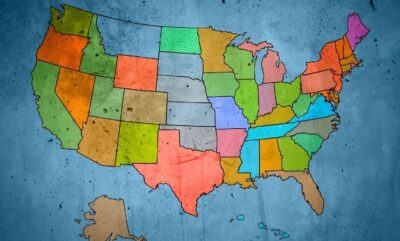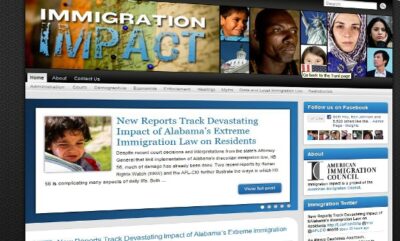State and Local

More States Introduce Costly Immigration Enforcement Bills in 2012
Despite the devastating consequences of state immigration laws in Alabama and Arizona, legislators in other states have introduced similar enforcement bills this year. Legislators in Mississippi, Missouri, Tennessee and Virginia introduced an array of costly immigration enforcement bills in their 2012 legislative sessions—some which are modeled on Arizona’s SB 1070. While study after study continues to document how these extreme state laws are costing state economies, disrupting entire industries and driving communities further underground, state legislators clearly aren’t getting the message. Read More

Alabama’s Extreme Immigration Law Could Cost State Billions, Report Finds
Implementing Alabama’s extreme immigration law (HB 56) would be incredibly expensive. That is the bottom line of a new report by University of Alabama economist Samuel Addy entitled A Cost-Benefit Analysis of the New Alabama Immigration Law. According to the report, the law could cost Alabama up to $11 billion in GDP and nearly $265 million in state income and sales tax. The loss includes 1) implementation, enforcement, and litigation expenditures; 2) increased costs and inconveniences for citizens and legal residents and businesses; 3) reduced economic development opportunities because it creates a poor business climate; and 4) the economic impact of reduced aggregate demand due to some unauthorized immigrants leaving and therefore not earning and spending income in the state. Read More

Nativist Group Twists Facts on Effectiveness of Arizona’s Immigration Law
The Federation for American Immigration Reform (FAIR) has outdone itself when it comes to shoddy research. In a recently released report on “demographic changes” in Arizona, FAIR utilizes an almost random assortment of statistics to make its case that the state’s unauthorized immigrants are fleeing in droves thanks to get-tough immigration policies. The report occasionally pays lip service to the impact on unauthorized immigration of the 2008-2009 recession, as well as persistently high unemployment rates that continue to this day. Yet FAIR concludes, without evidence, that state-level immigration enforcement has been the single most important factor causing the decline of the unauthorized population. In reality, this conclusion is not supported by the data which FAIR presents. Read More

Immigrants, Latinos and Asians Contribute More to Your State Than You Think
Immigration has never been a numbers game. When people think of immigration in America, they likely call to mind fear-fueled myths perpetuated by immigration restrictionists, like “immigrants are stealing American jobs” or “immigrants are a drain on our system.” Sadly, numbers and facts have rarely been part of the discussion, especially as state legislatures continue to take immigration law into their own hands. Today, however, the Immigration Policy Center published 50 state fact sheets updated to show just how much immigrants, Latinos and Asians contribute to our country as consumers, taxpayers, workers, entrepreneurs and voters—facts state legislators would do well to consider before passing legislation that drives immigrants, undocumented and documented, from their state. Read More

Immigration Impact’s Top 11 Blogs of 2011
A review of immigration issues for 2011 reads like a rollercoaster of American politics. Some state legislatures, for example—backed by restrictionists groups—attempted to pass harsh enforcement-only immigration laws. Some states succeeded; others struck down these bills; and a few even passed progressive immigration laws like tuition equity for undocumented students. At the federal level, Congress failed yet again to take major action on immigration, but allowed a few humanitarian and refugee issues to pass. The Obama administration deported a record high number of immigrants, but at the same time issued prosecutorial discretion guidelines in an attempt to prioritize enforcement efforts. While our top 11 blog posts—those most read, shared and commented on in the past year—couldn’t possibly tell the whole immigration story of 2011, the list does provides an interesting snapshot of what moved people and prompted reactions throughout the year. Read More

Immigration Impact’s Top 11 Blogs of 2011
A review of immigration issues for 2011 reads like a rollercoaster of American politics. Some state legislatures, for example—backed by restrictionists groups—attempted to pass harsh enforcement-only immigration laws. Some states succeeded; others struck down these bills; and a few even passed progressive immigration laws like tuition equity for undocumented students. At the federal level, Congress failed yet again to take major action on immigration, but allowed a few humanitarian and refugee issues to pass. The Obama administration deported a record high number of immigrants, but at the same time issued prosecutorial discretion guidelines in an attempt to prioritize enforcement efforts. While our top 11 blog posts—those most read, shared and commented on in the past year—couldn’t possibly tell the whole immigration story of 2011, the list does provides an interesting snapshot of what moved people and prompted reactions throughout the year. Read More

New Reports Track Devastating Impact of Alabama’s Extreme Immigration Law on Residents
Despite recent court decisions and interpretations from the state’s Attorney General that limit implementation of Alabama’s draconian immigration law, HB 56, much of damage has already been done. Two recent reports by Human Rights Watch (HRW) and the AFL-CIO further illustrate the ways in which HB 56 is complicating many aspects of daily life. Both organizations sent delegations to Alabama to interview a wide variety of Alabama residents and found that the fallout goes well beyond the official implementation of the law’s provisions and extends to personal relationships. Both found that the law is just one part of an agenda to deny people fundamental rights. Read More

As Iowa Caucuses Approach, Signatories of Iowa Compact Hope to Reframe Immigration Debate
Exhausted by the base immigration rhetoric prevalent in the GOP presidential debate, a group of concerned Iowans is seeking to reframe the issue in anticipation of the Iowa Caucuses next month. Last week, business, faith and city leaders in Iowa signed the Iowa Compact—a list of five principles meant to guide how people discuss immigration. Signatories of the compact, which is modeled after Utah and Indiana’s Compact, urged politicians “to stop playing politics on the issue” and said that state level fixes, like enforcement-only legislation, do “not address the root problem of immigration” but instead hurts economies and communities. Read More

Federal Verification System Won’t Help Alabama Determine Legal Status Under New Law
While the devastating impacts of Alabama’s over-the-top immigration law, HB 56, continues to be felt by Alabamans, there have been a recent string of victories. In addition to a federal judge’s ruling this week temporarily blocking state agencies from denying mobile home registrations to immigrants who cannot prove legal status, the state’s Attorney General also recently issued a memo limiting the scope of the law. It is becoming more and more evident that enforcing HB 56 is not as clear cut as its proponents thought it would be. Read More

Federal Judge Blocks Yet Another Provision of Alabama’s Extreme Anti-Immigrant Law
As if people needed more proof that Alabama’s extreme anti-immigrant law, HB 56, is bad for the state, a federal judge temporarily blocked enforcement of yet another provision of the law this week. U.S. District Court Judge Myron Thompson temporarily enjoined enforcement of Section 30 that, as applied, requires mobile home owners to provide proof of lawful status before renewing their registration. Judge Thompson’s ruling, in which he calls Alabama’s law “discriminatorily based,” is the latest in a series of blows to the harsh law—a law that even Alabama’s own attorney general and governor find problematic. Read More
Make a contribution
Make a direct impact on the lives of immigrants.
